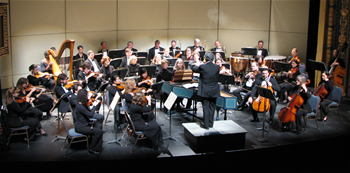The Brevard Music Center’s Summer Institute and Festival continued July 19 with a public dress rehearsal of the celebrated Rodgers & Hammerstein classic, The Sound of Music. Since the sound of music resounds from the Transylvania hills from mid-June to August 6, the selection of this show as one of the summer’s three major stage works was clearly apt, and it’s good to be able to report that the great score was exceedingly well served by the vocal forces assembled under the banner of the Janiec Opera Company. In the pit of the Whittington-Pfohl Auditorium were members of the Brevard Music Center Orchestra; the 42 or so musicians (including 21 strings) were under the direction of conductor John Greer. The show was staged by Michael Ehrman and choreographed by Sandra Neels. The chorus master was Gerard Floriano.
The Sound of Music is one of the darker R&H musicals, comparable with South Pacific in terms of the issues it raises and no less demanding in purely artistic terms. In Brevard, the cast was headed by mezzo-soprano Erica Brookhyser, whose portrayal had literally everything – a stunning voice used with the utmost intelligence and skill, superior diction, great acting ability, fluid onstage motion, and looks that are ideal for the role of Maria. She brightened every scene in which she appeared and seemed to inspire everyone around her to superior levels of performance, too.
The leadership of the abbey consisted of Sarah Parker, Kimberly Hoover, Amedee Moore, Laura Botkin, Regan Lackey, and Ariana Pullano. Together, they formed quite a chorus line of nuns; individually, they did amazingly well, differentiating the diverse characters they represented. When augmented by novices, postulates, and others, they put up an impressive wall of nicely unified choral sound. And Parker was especially fine as the Mother Abbess, to whom R&H awarded several choice vocal plums and one of the work’s most important roles, dramatically.
As Georg von Trapp, bass-baritone Adam Cioffari looked a bit young to be a naval Captain and widower, too, and his acting was stiff for a member of the landed class who had risen to such high rank, but he was a winner in the vocal department, for sure, and he made the most of the several fine solo bits allotted to him. His seven children were utterly charming and effective, and it’s a shame that only one received a proper program bio. From the youngest up, they were Hannah Di Bella, Maria Floriano, Jennie Moser, Steven Berry, Allie Cagen, Jordan Lulloff, and Elizabeth Westerman.
Elsa, the other love interest, was portrayed with great effectiveness by Ashley Stone, and her pal Max, of Salzburg Festival fame, was Evan Broadhead.
Rounding out the cast were Joseph Legaspi (the butler), Jessica Best (the housekeeper), Christopher Camp (Rolf), Daniel Williamson (Zeller), John Reynolds (Elberfeld), Max Wier (the Admiral), and Ann Sauder (a postulate). There was some double casting – several nuns turned up in mufti, as party guests, and the Admiral, also out of uniform, crashed the party, too, as a neighbor.
The program expressed thanks to the Tulsa Opera but the reason wasn’t clear. The sets were designed by Lora Napier and built at Brevard in just a week; under the circumstances, they were as amazing as most of the singing, and the few glitches during the dress rehearsal were surely corrected promptly. The lighting was by Andrea Boccanfuso, the costumes were designed and/or coordinated by Sandra London, and Jori Mars Malan was responsible for wigs and makeup. Other staffers were Bethanie Wampol (props), Patrick Finn (technical director), Chad Stewart (sound), and Lee Helms (stage manager). The singers were amplified, and their microphones were at times disconcertingly obvious – they looked like those mouthpieces worn by switchboard operators. There’s something to be said for this approach since it keeps people from fading out, but the devices were quite obvious. There were a few places where the amplification threw the sound into the wrong parts of the stage; mostly these involved excessive support for guitar-accompanied passages. All this said, the amplification was as good as the rest of the show, which means it was of extremely high quality.
The production was advertised as having English super- (or sub-) titles but these were nowhere to be seen. As it happens, the diction was so consistently good that no additional support was needed.
The show worked the magic it has worked on the public since its first live performances. It’s a superior score, a superior bit of theatre, and it’s rooted in historical fact – the Trapp Family escaped from Austria following the Anschluß and enjoyed considerable fame as a touring ensemble. It inspired some of the best work of two of our nation’s finest creators of musicals. It was produced in Brevard by a large cast and crew, some of whom are new to this business, and the results were impressive – this one’s good enough to go back right away to see again. The words came across all the time. The music was rendered accurately and artistically, and it often moved the large crowd, sometimes quite deeply. We may or may not be hearing some of these singers again, but all of ’em are worth hearing, and I for one will be disappointed if this was a one-shot success for Erica Brookhyser, who so richly deserved the huge ovation she received at the end of The Sound of Music. Bravo to all concerned!
The final performance of The Sound of Music is July 22. See our Western calendar for details.











